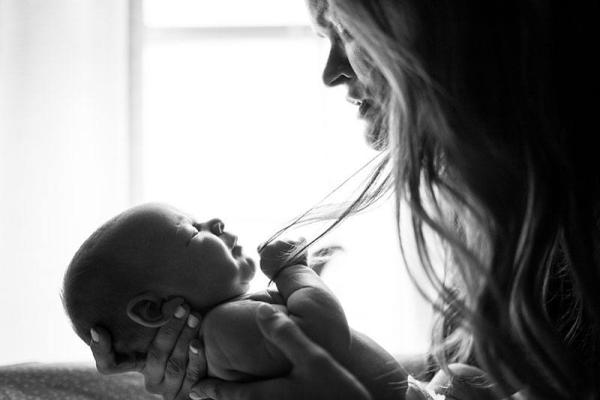Researchers Delve Into New Moms’ Depression
Researchers Delve Into New Moms’ Depression

Many women develop symptoms of depression after giving birth. IRP research is helping to characterize the course of those symptoms and the risk factors that may contribute to them.
Fresh off celebrating Mother’s Day this past Sunday, as well as Women’s Health Week this week, it’s important to acknowledge that being a new mom isn’t easy. As joyful and exciting as a new baby might be, it can be exhausting and worrisome, too. Many new moms experience some level of baby blues, but for some women, those blues can take a downward turn into symptoms of more serious depression.
Approximately one out of every eight women in the U.S. experiences symptoms of postpartum depression, according to the U.S. Centers for Disease Control and Prevention. What’s more, a recent study led by IRP staff scientist Diane Putnick, Ph.D., has shown that the course of postpartum depression can differ significantly among women. The study of nearly 5,000 women not only showed that 25 percent of them experienced symptoms of postpartum depression, but it also found that depression symptoms followed several different patterns and could persist for at least three years after giving birth.1 Understanding these different patterns of symptoms and some of the risk factors associated with them may help physicians recognize and monitor mothers who are at higher risk for persistent depression.
Good mental health is important not only for the mothers’ well-being, but for their children as well. Dr. Putnick points out that there’s a great deal of research that shows a mother’s mental health has a direct impact on her child’s cognitive, emotional, and behavioral development. Moreover, while obstetricians and mental health professionals are the traditional healthcare providers that diagnose and treat postpartum depression, the doctor most new moms see most consistently is their child’s pediatrician.
“The American Academy of Pediatrics recommends depression screening for new moms at well-child visits, but only up to six months after the birth of the child,” Dr. Putnick says. “I hope this study, and others like it, will show that period needs to be extended. Six months isn’t long enough to know if the mom is getting better.”

Dr. Diane Putnick
To map out the different trajectories of postpartum depression, Dr. Putnick and her colleagues in the lab of IRP senior investigator Edwina Yeung, Ph.D., analyzed data from a study of mothers and children from upstate New York that began in 2008. The mothers were given regular assessments, including a brief screening for depression at intervals beginning four months after their children were born and continuing until the children were 3 years old.
The good news was that about three quarters of the women had very low depression symptoms throughout the study. Another 13 percent of women had medium-level depressive symptoms that got better over time. However, about 8 percent of mothers had depressive symptoms that actually worsened over time, and another 4 percent experienced depressive symptoms that remained consistently high throughout the study.
“A lot of people think postpartum depression is something that will go away if they just wait long enough,” Dr. Putnick says, “but when the study came out, people reached out to me from the public to say, ‘Hey, this is me. This happened to me, and my doctor didn’t believe that it could still be postpartum depression.’”
To get a clearer picture of why women might fall into these various depression patterns, Dr. Putnick and her colleagues also looked at the medical histories and sociodemographic traits of the women in the study. The researchers found that women who had had a mood disorder in the past were more likely to experience postpartum depression, as were younger mothers and women with lower levels of education. In addition, women with gestational diabetes were more likely to experience symptoms of postpartum depression. Exactly why these factors may contribute to a higher risk for depression is still a mystery, but Dr. Putnick is continuing her studies to get to the bottom of it.
“The fact that younger mothers and mothers with less education were more likely to be in the persistently depressed group indicates that stress might be a factor,” she explains. “These are women who are having babies relatively young and women who maybe haven't completed the education they wanted to or who have fewer resources, for example. I think that there's also very likely a genetic component to this, as well as the effects of hormone changes.”

Because kids whose mothers are depressed are more likely to experience cognitive and behavioral problems, better understanding postpartum depression is critical for improving the lives of both women and children.
Because the children of mothers with depression are at higher risk for cognitive, behavioral, and developmental delays, Dr. Putnick is currently looking at how mothers’ depression affects kids’ fine and gross motor skills, communications, cognition, and interpersonal and social skills. It’s still early, but she says it appears that postpartum depression may be associated with children’s social skills.
“If you think about it in terms of a mom who is depressed in those early years, one of the major ways depression manifests is fatigue and lack of energy,” says Dr. Putnick, “so she may not have the energy to play with her child or take them out where they can experience different stimuli and situations.”
By identifying the factors that influence mothers’ depression and children’s development, researchers like Dr. Putnick can help physicians and mental healthcare providers be better equipped to help both moms and kids. Moving forward, Dr. Putnick is excited to share these findings and translate them directly into regular practice.
“We’ve focused on questions that parents and pediatricians really want to know the answers to,” Dr. Putnick says. “I think one of the reasons this study has gotten so much attention is that it was really easy to talk about it with people and show the impact of the work quickly.”
References:
[1] Putnick DL, Sundaram R, Bell EM, Ghassabian A, Goldstein RB, Robinson SL, Vafai Y, Gilman SE, Yeung E. Trajectories of maternal postpartum depressive symptoms. Pediatrics. 2020 Nov 1;146(5):e20200857. doi: 10.1542/peds.2020-0857.
Subscribe to our weekly newsletter to stay up-to-date on the latest breakthroughs in the NIH Intramural Research Program.
Related Blog Posts
- Wearable Tech Tracks Ebbs and Flows of Bipolar Disorder
- Gender Differences in Emotional Responses May Start in the Womb
- Moms’ Caffeine Consumption May Affect Babies’ Brains
- Rare Genetic Variants Underlie Susceptibility to Reproductive Disruption
- Genes Contribute to Population-Based Differences in Antidepressant Response
This page was last updated on Wednesday, May 24, 2023
